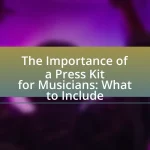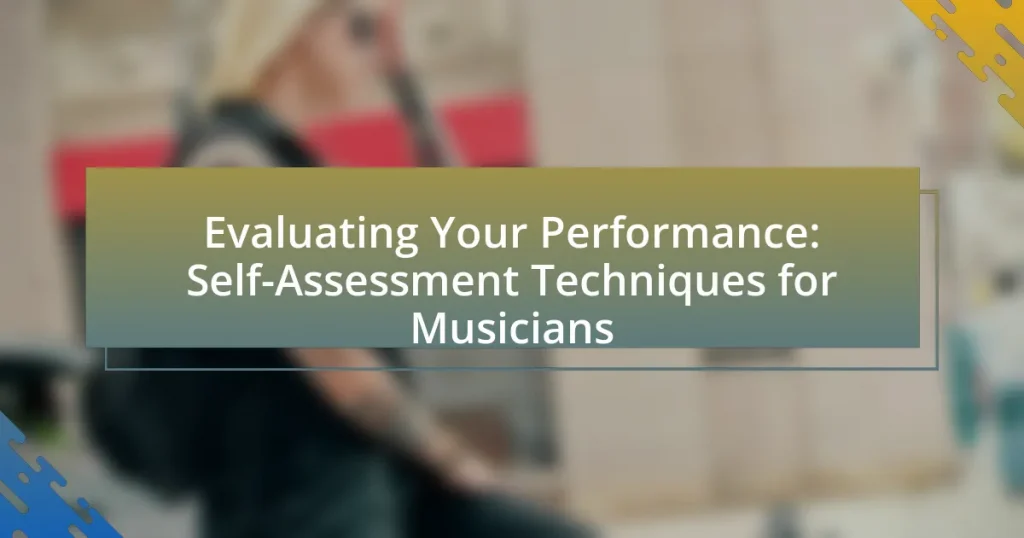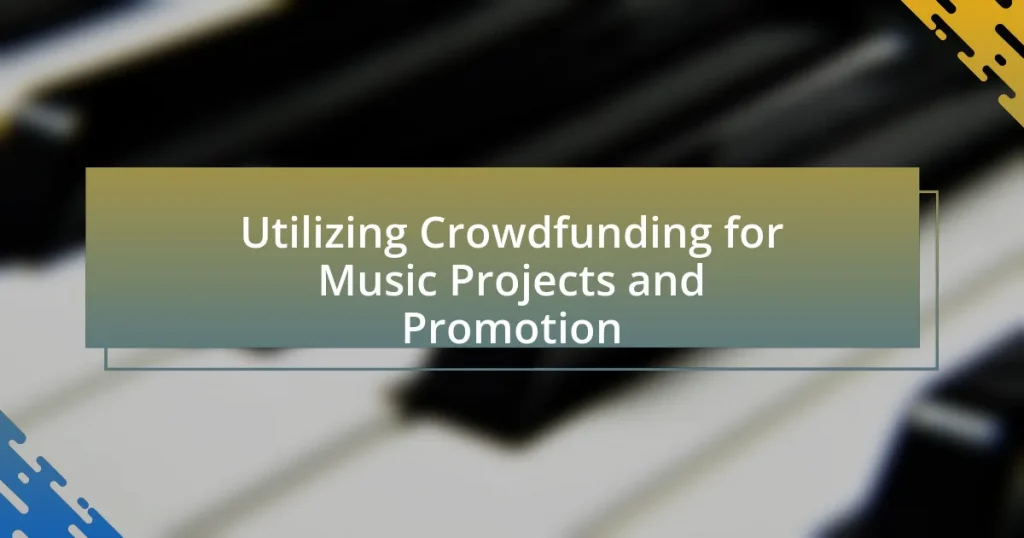Self-assessment in music performance is a critical process where musicians evaluate their own playing or singing to identify strengths and areas for improvement. This article explores the importance of self-assessment for musicians, detailing how it enhances musical skills, fosters self-awareness, and promotes accountability in practice routines. Key components of effective self-assessment, methods for identifying strengths and weaknesses, and tools available for musicians are discussed. Additionally, the article addresses common challenges in self-assessment, strategies to maintain objectivity, and resources to improve self-assessment skills, emphasizing the role of technology in facilitating this process.
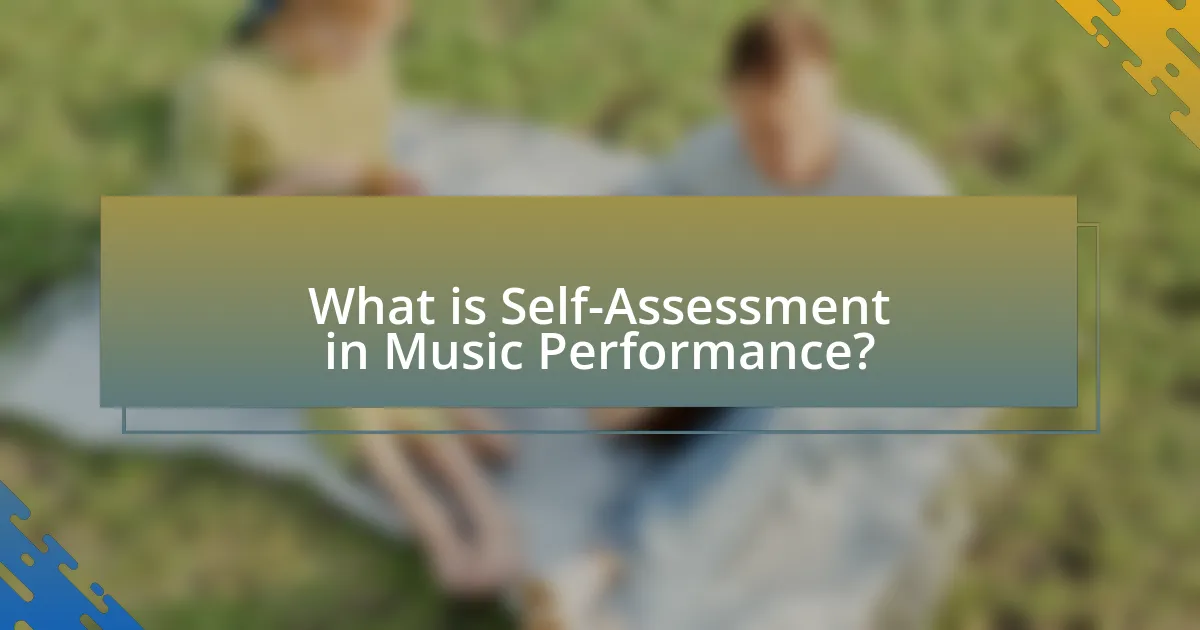
What is Self-Assessment in Music Performance?
Self-assessment in music performance is the process by which musicians evaluate their own playing or singing to identify strengths and areas for improvement. This technique allows performers to develop critical listening skills and self-awareness, which are essential for artistic growth. Research indicates that self-assessment can enhance learning outcomes, as it encourages musicians to set personal goals and reflect on their progress, ultimately leading to improved performance quality.
Why is Self-Assessment Important for Musicians?
Self-assessment is important for musicians because it enables them to critically evaluate their skills, identify areas for improvement, and set realistic goals for their development. By engaging in self-assessment, musicians can gain insights into their performance strengths and weaknesses, which is essential for continuous growth. Research indicates that self-reflection enhances learning outcomes; for instance, a study published in the Journal of Music Education found that musicians who regularly assessed their performances showed significant improvement in technical skills and musical interpretation. This process fosters a deeper understanding of their artistry and promotes accountability in their practice routines.
How does Self-Assessment Enhance Musical Skills?
Self-assessment enhances musical skills by allowing musicians to critically evaluate their performance and identify areas for improvement. This reflective practice fosters greater self-awareness, enabling musicians to set specific goals and track their progress over time. Research indicates that self-assessment can lead to improved motivation and engagement, as musicians become more invested in their learning process. For instance, a study published in the Journal of Research in Music Education found that students who engaged in self-assessment demonstrated significant gains in their musical abilities compared to those who did not. This evidence supports the notion that self-assessment is a vital tool for developing and refining musical skills.
What Role Does Self-Assessment Play in Performance Improvement?
Self-assessment plays a crucial role in performance improvement by enabling individuals to identify their strengths and weaknesses. This reflective practice allows musicians to evaluate their skills, set specific goals, and track their progress over time. Research indicates that self-assessment fosters greater self-awareness, which is essential for targeted practice and skill enhancement. For instance, a study published in the Journal of Music Education Research found that musicians who engaged in regular self-assessment showed a 30% improvement in their performance accuracy compared to those who did not. This evidence underscores the effectiveness of self-assessment as a tool for continuous improvement in musical performance.
What Are the Key Components of Effective Self-Assessment?
The key components of effective self-assessment include clarity of goals, honest reflection, specific criteria for evaluation, and actionable feedback. Clarity of goals ensures that musicians understand what they aim to achieve, which guides their assessment process. Honest reflection allows musicians to critically evaluate their performance without bias, fostering genuine improvement. Specific criteria for evaluation provide measurable standards against which musicians can assess their skills and progress. Actionable feedback enables musicians to identify areas for improvement and develop targeted strategies for growth. These components collectively enhance the self-assessment process, leading to more effective performance evaluation and development.
How Can Musicians Identify Their Strengths and Weaknesses?
Musicians can identify their strengths and weaknesses through self-assessment techniques such as recording practice sessions, seeking feedback from peers or mentors, and utilizing structured evaluation tools like skill assessments. Recording allows musicians to objectively listen to their performance, highlighting areas of proficiency and those needing improvement. Feedback from experienced musicians provides external perspectives that can reveal blind spots in a musician’s self-perception. Structured evaluation tools, including checklists or rating scales, offer a systematic approach to assess various aspects of musicianship, such as technical skills, creativity, and stage presence. These methods collectively enable musicians to gain a comprehensive understanding of their abilities and areas for growth.
What Tools and Techniques Are Available for Self-Assessment?
Self-assessment tools and techniques for musicians include practice journals, video recordings, peer feedback, and self-reflection questionnaires. Practice journals allow musicians to track their progress, set goals, and identify areas for improvement. Video recordings enable musicians to visually analyze their performances, providing insights into technique and expression. Peer feedback offers an external perspective, helping musicians understand how their performance is perceived by others. Self-reflection questionnaires prompt musicians to evaluate their skills, experiences, and emotional responses to performances, fostering deeper self-awareness. These methods collectively enhance a musician’s ability to assess their performance effectively.
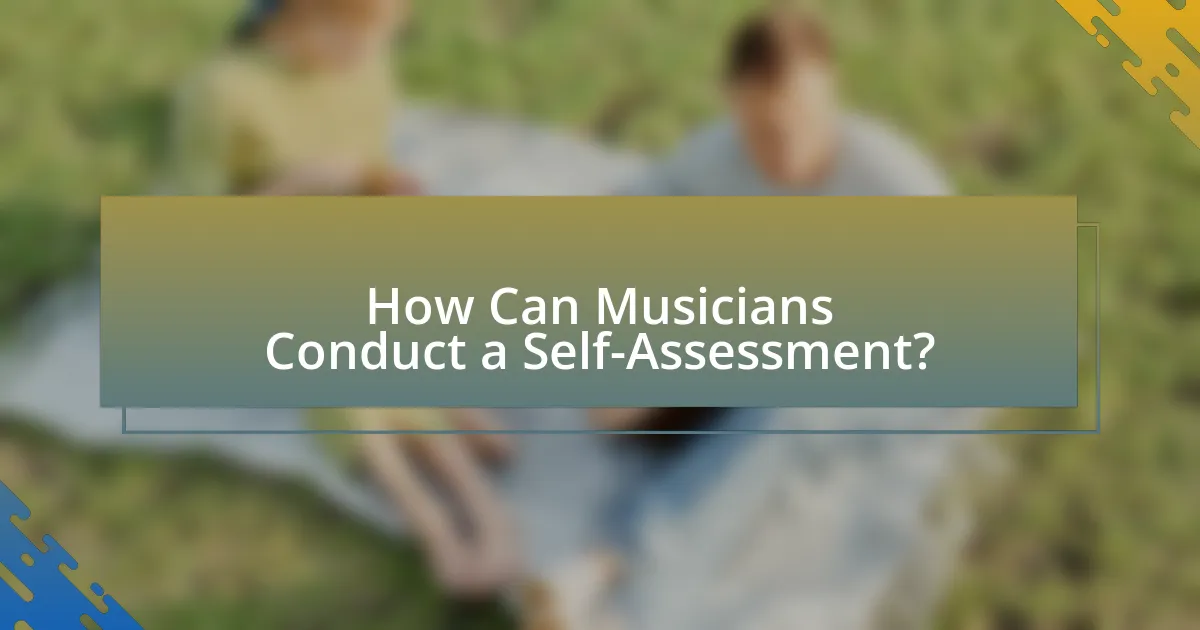
How Can Musicians Conduct a Self-Assessment?
Musicians can conduct a self-assessment by systematically evaluating their skills, performance, and progress. This process involves setting specific goals, recording practice sessions, and analyzing performances to identify strengths and weaknesses. For instance, musicians can use video recordings to review their technique and stage presence, allowing them to pinpoint areas for improvement. Research indicates that self-reflection enhances learning outcomes; a study published in the Journal of Music Education found that musicians who regularly assessed their performances showed greater skill development over time. By incorporating structured feedback and self-reflection, musicians can effectively gauge their progress and make informed decisions about their practice strategies.
What Steps Should Musicians Follow for an Effective Self-Assessment?
Musicians should follow a structured approach for effective self-assessment, which includes setting clear goals, recording performances, analyzing strengths and weaknesses, seeking feedback, and creating an action plan. Setting clear goals allows musicians to define what they want to achieve, providing a benchmark for evaluation. Recording performances enables musicians to review their work objectively, identifying areas for improvement. Analyzing strengths and weaknesses helps musicians understand their current skill level and areas needing development. Seeking feedback from peers or mentors offers external perspectives that can highlight blind spots. Finally, creating an action plan outlines specific steps to address identified weaknesses and enhance strengths, ensuring continuous improvement in their musical journey.
How Can Musicians Set Specific Goals for Their Assessment?
Musicians can set specific goals for their assessment by identifying clear, measurable objectives related to their performance skills. For instance, a musician might aim to improve their sight-reading ability by practicing a certain number of pieces each week or increasing their metronome speed by a specific BPM over a month. Research indicates that setting SMART goals—Specific, Measurable, Achievable, Relevant, and Time-bound—enhances motivation and performance outcomes. By defining these parameters, musicians can track their progress effectively and make necessary adjustments to their practice routines.
What Methods Can Musicians Use to Record and Analyze Their Performances?
Musicians can use digital audio workstations (DAWs), mobile recording apps, and video recording to record and analyze their performances. DAWs, such as Pro Tools or Ableton Live, allow musicians to capture high-quality audio, edit tracks, and analyze sound waves for pitch and timing accuracy. Mobile recording apps, like GarageBand or Voice Memos, provide convenient options for quick recordings and playback, enabling musicians to assess their performances on the go. Video recording, using smartphones or cameras, allows musicians to visually analyze their stage presence, posture, and interaction with other performers, which is crucial for overall performance evaluation. These methods are widely used in the music industry, as they provide musicians with the tools necessary for effective self-assessment and improvement.
How Can Feedback Enhance the Self-Assessment Process?
Feedback enhances the self-assessment process by providing external perspectives that can identify strengths and weaknesses in a musician’s performance. This external input allows musicians to gain insights that they may overlook during self-evaluation, leading to a more accurate understanding of their skills. Research indicates that feedback can significantly improve learning outcomes; for instance, a study published in the Journal of Educational Psychology found that students who received specific feedback showed a 30% improvement in performance compared to those who did not. By integrating feedback into self-assessment, musicians can refine their techniques, set realistic goals, and track their progress more effectively.
What Types of Feedback Should Musicians Seek?
Musicians should seek constructive feedback, audience reactions, and peer reviews. Constructive feedback focuses on specific aspects of performance, such as technique, expression, and stage presence, allowing musicians to identify areas for improvement. Audience reactions provide insight into how well the music resonates with listeners, which is crucial for understanding the emotional impact of a performance. Peer reviews from fellow musicians can offer valuable perspectives on musicianship and artistry, as they often share similar experiences and challenges. Collectively, these types of feedback help musicians refine their skills and enhance their overall performance quality.
How Can Peer Reviews Contribute to Self-Assessment?
Peer reviews can significantly enhance self-assessment by providing musicians with external perspectives on their performance. This feedback allows musicians to identify strengths and weaknesses that they may overlook during self-evaluation. For instance, a study published in the Journal of Music Education Research found that peer feedback led to improved self-awareness and performance skills among musicians, as they received constructive criticism that highlighted areas for improvement. By integrating peer reviews into their self-assessment process, musicians can develop a more comprehensive understanding of their abilities and progress.
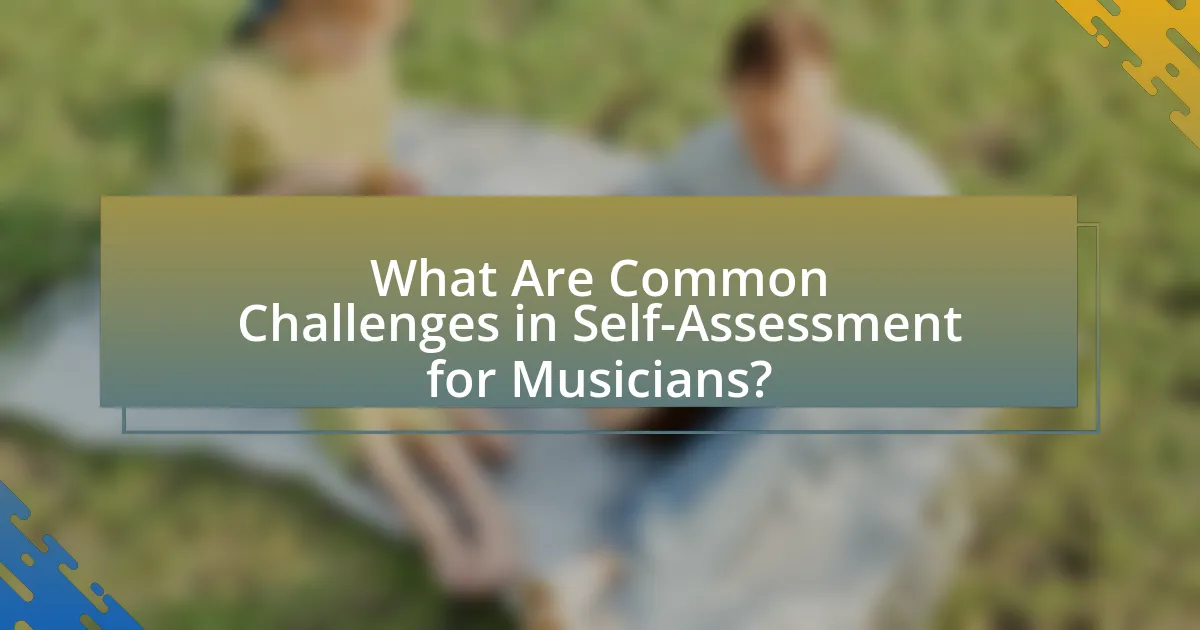
What Are Common Challenges in Self-Assessment for Musicians?
Common challenges in self-assessment for musicians include difficulty in objectively evaluating their own performance, lack of clear criteria for assessment, and emotional biases that can cloud judgment. Musicians often struggle to separate their personal feelings about their performance from an accurate evaluation of their skills, which can lead to overestimating or underestimating their abilities. Additionally, without established benchmarks or specific goals, musicians may find it hard to measure progress effectively. Research indicates that self-assessment can be hindered by these factors, as musicians may rely on subjective impressions rather than concrete metrics, making it challenging to achieve an accurate understanding of their performance levels.
How Can Musicians Overcome Bias in Self-Assessment?
Musicians can overcome bias in self-assessment by employing objective evaluation methods, such as recording performances and analyzing them critically. This approach allows musicians to compare their self-perception with actual performance quality, reducing the influence of personal biases. Research indicates that objective feedback, such as peer reviews or expert critiques, can further enhance self-assessment accuracy by providing an external perspective. For instance, a study published in the Journal of Music Education found that musicians who engaged in structured peer evaluations reported improved self-awareness and performance insights.
What Strategies Help Musicians Maintain Objectivity?
Musicians can maintain objectivity by employing strategies such as recording their performances, seeking feedback from peers, and using structured self-assessment tools. Recording allows musicians to listen to their work from an outsider’s perspective, which can highlight areas for improvement that may not be apparent during live performance. Seeking feedback from trusted peers provides an external viewpoint that can counteract personal biases. Structured self-assessment tools, like checklists or rating scales, enable musicians to evaluate specific aspects of their performance systematically, fostering a more objective analysis. These strategies are supported by research indicating that external feedback and self-reflection are critical for effective self-assessment in artistic disciplines.
How Can Musicians Deal with Emotional Responses During Self-Assessment?
Musicians can deal with emotional responses during self-assessment by implementing structured reflection techniques. These techniques include setting specific goals for self-assessment, using objective criteria to evaluate performance, and practicing mindfulness to manage emotional reactions. Research indicates that structured self-assessment can reduce anxiety and enhance performance awareness, as evidenced by a study published in the Journal of Music Education, which found that musicians who utilized goal-setting and objective evaluation reported lower levels of emotional distress during self-assessment. By focusing on clear objectives and maintaining a mindful approach, musicians can effectively navigate their emotional responses and improve their self-evaluation process.
What Resources Are Available for Musicians to Improve Self-Assessment Skills?
Musicians can improve self-assessment skills through various resources, including online courses, apps, and books. Online platforms like Coursera and Udemy offer courses specifically designed for musicians to develop self-evaluation techniques, often featuring expert instructors and structured feedback mechanisms. Apps such as TonalHarmony and SmartMusic provide tools for musicians to record their performances and receive instant feedback on their playing. Additionally, books like “The Musician’s Way” by Gerald Klickstein offer comprehensive strategies for self-assessment and practice improvement. These resources are validated by their widespread use in music education and positive reviews from musicians seeking to enhance their skills.
Which Books and Online Courses Focus on Self-Assessment Techniques?
Books that focus on self-assessment techniques for musicians include “The Musician’s Way” by Gerald Klickstein, which provides strategies for evaluating practice and performance, and “Effortless Mastery” by Kenny Werner, which emphasizes self-reflection in musical growth. Online courses such as “Self-Assessment for Musicians” on platforms like Coursera offer structured approaches to evaluating one’s skills and progress. These resources are validated by their widespread use in music education and their positive reviews from both educators and students, highlighting their effectiveness in fostering self-awareness and improvement in musicianship.
How Can Technology Aid in the Self-Assessment Process?
Technology can significantly aid in the self-assessment process for musicians by providing tools that facilitate performance analysis and feedback. Digital audio workstations (DAWs) allow musicians to record, edit, and analyze their performances, enabling them to identify areas for improvement. Additionally, software applications can offer real-time feedback on pitch accuracy, timing, and dynamics, which are crucial for skill development. For instance, apps like SmartMusic and Yousician provide interactive exercises and assessments that help musicians track their progress over time. Research indicates that musicians who utilize technology for self-assessment show improved performance outcomes, as they can engage in more objective evaluations of their skills.
What Practical Tips Can Musicians Use for Effective Self-Assessment?
Musicians can use specific techniques for effective self-assessment by regularly recording their practice sessions and performances. This allows them to objectively evaluate their playing, identify areas for improvement, and track their progress over time. Research indicates that self-recording enhances self-awareness and critical listening skills, which are essential for musical development. Additionally, musicians should set clear, measurable goals for their practice, enabling them to focus on specific skills or pieces. By reflecting on their achievements and challenges in a practice journal, musicians can gain insights into their growth and areas needing attention.



